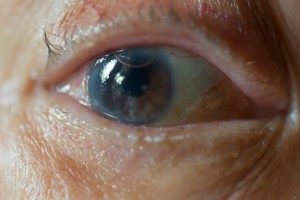 October is Home Eye Safety Month, so we present our top health stories discussing cataracts, glaucoma, eye floaters, night blindness, and more. Nearly half of eye injuries occur at home, so various health organizations will be raising awareness of the threats you home poses to your vision.
October is Home Eye Safety Month, so we present our top health stories discussing cataracts, glaucoma, eye floaters, night blindness, and more. Nearly half of eye injuries occur at home, so various health organizations will be raising awareness of the threats you home poses to your vision.
The Friends for Sight organization has put together a list of helpful tips in order to protect your vision. These include wearing eye protection, following safety precautions when using stairs, removing debris and obstacles in walking areas, and always washing your hands before washing your face.
Advertisement
Below you will find more helpful tips to protect your eyes and your vision.
Prevent cataracts naturally: Home remedies and diet
For most people, cataracts develop slowly and don’t disrupt the vision early on. But with time and age, this will interfere with your daily life and you’ll need eyeglasses. You may need surgery down the road, generally, a safe and effective procedure. But still…the question is how to slow down cataracts? Are there any natural remedies for cataracts? Is there a natural way to cure cataract even?
If you’re asking these questions, you’re not alone. According to the U.S. Centers for Disease Control and Prevention (CDC), an estimated 20.5 million (17.2 percent) Americans aged 40 years and older have cataract in one or both eyes, and 6.1 million (5.1 percent) have had their lens removed operatively. The total number of people who have cataracts is estimated to increase to 30.1 million by 2020. Continue reading…
 Glaucoma: Natural home remedies and diet
Glaucoma: Natural home remedies and diet
Glaucoma, a condition that affects the eyes, can be quite serious and even result in blindness. The older you become, the more prone you are to developing glaucoma. Glaucoma patients typically range between 45 and 64 years of age.
Glaucoma can strike without warning and without symptoms. There is no cure for glaucoma, so it’s important to take the necessary steps to prevent it. This can be done through nutrition and diet, which can deter the onset of this eye condition. Continue reading…
 How to get rid of eye floaters naturally
How to get rid of eye floaters naturally
Eye floaters are spots moving through your field of vision. They may appear black or grey, stringy or cobweb-like, they may move, drift, or dart when you move your eyes. Many eye floaters are brought on by age-related changes in the eyes – for example, when the jellylike substance of the eye becomes liquefied. If eye floaters appear and increase quickly or suddenly, you should see an eye specialist right away.
There are many different reasons for eye floaters. Some are harmless and others require immediate medical attention. The following natural remedies may help you get rid of eye floaters. Continue reading…
 Natural ways to improve night vision (night blindness)
Natural ways to improve night vision (night blindness)
For many people, especially older people, the beauty of nighttime is getting obscured by a condition called nyctalopia, more commonly referred to as night blindness. Not only can these people not appreciate the beauty of night, they cannot easily do their regular day-to-day activities like reading, knitting, driving, or even walking at night.
Advertisement
When you go for a regular eye test, your eyesight is checked in good light. In most cases (if not all), the optometrist does not test for night blindness. This is not ideal practice, considering night blindness can lead to many other health complications. Continue reading…
 Daily habits damaging your vision and eye health
Daily habits damaging your vision and eye health
Our eyes put up with a lot. Hours in front of the TV or computer, ambient low lighting in a restaurant, squinting into the sun while driving (even with sunglasses), the list goes on and on. And despite how important our eyesight is, we tend to take it for granted.
There are certain habits, in particular, that we continue to put our eyes through that are actually quite damaging. If any of the following sounds familiar, now’s the time to stop. You’ve only got the one pair after all. Continue reading…
